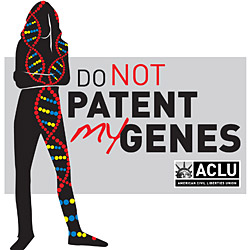
On Monday, the Court of Appeals for the Federal Circuit held a hearing in the landmark lawsuit challenging gene patents before a crowded courtroom in Washington, D.C. The case, brought by the ACLU and the Public Patent Foundation on behalf of geneticists, pathologists, health advocates, and patients, seeks to invalidate Myriad Genetics' patents on two genes associated with hereditary breast and ovarian cancer, BRCA1 and BRCA2.
For over 20 years, the U.S. Patent and Trademark Office (PTO) has been granting patents on human genes, which give the patent owners exclusive rights to test and examine certain genes. About 20 percent of the human genome is now patented. But last year, federal district court Judge Robert Sweet ruled in favor of the plaintiffs' position that genes are not patentable. Myriad appealed the ruling to Court of Appeals for the Federal Circuit.
The key question at the hearing yesterday was whether an "isolated" BRCA gene, separated from the rest of a person's DNA, can be patented. The question is crucial because allowing patents on an isolated gene prevents labs from sequencing that gene in any and every patient, unless they obtain permission from the patentholder. That means patients' ability to find out about their own genetic information is dictated by the patentholder.
While everyone agrees that new techniques or processes are patentable, products of nature — like gold, or gravity — have never been patentable. We don't believe that DNA should be any different.
Arguing for the ACLU, Chris Hansen noted that isolation cannot be the test for patentability:
If a surgeon cuts me open, and slices out my kidney, and takes it out and holds it in his hand, it's an 'isolated' kidney, but it's still a kidney. It's not an invention.
Arguing alongside the ACLU yesterday was Acting Solicitor General Neal Katyal, who earlier filed a friend-of-the-court brief asserting that patents issued by the PTO covering isolated DNA are invalid. Katyal explained what led the government to reverse its previous position:
We couldn't write a brief that allowed the patentability of isolated DNA, for to do so would be to make lithium patentable, uranium, coal from the earth, and a whole variety of other substances… It was just impossible to do given the Supreme Court's clear guidance… that there is a fundamental distinction in [the patent law] between human-made inventions, on the one hand, and products of nature, on the other.
One reason why the issue of what can be patented is so important to the ACLU is that patents on knowledge and thought violate the First Amendment. The government can't grant monopolies on fields of knowledge or abstract thought. But some of Myriad's claims cover the mental process of "comparing" two sequences. As Chris explained to the judges:
There are people who have put their entire genome sequence on the web. In addition, the BRCA1 sequence can be found on the web... If your law clerks went back to your chambers, and put the whole genome sequence of someone like Professor Church at Harvard and the BRCA1 sequence side by side on your computer screen, and you went back into chambers, and all you did was let your eyes go back and forth between the two to see if they were the same or different, George Church, who sequenced his own gene, would not have infringed the [patent] claims, your law clerks would not have infringed the [patent] claims. You would've infringed the [patent] claims.
If you'd like to listen to Monday's argument, audio of the full 70-minute hearing is available on the .
The court will likely issue a ruling sometime in the next several months. In the meantime, to learn more about the case, the plaintiffs, and what you can do to help, visit www.aclu.org/brca.
Learn more about the case challenging gene patents: Subscribe to our newsletter, , and .

